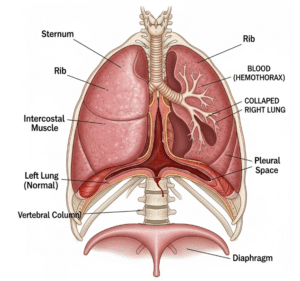➤ Overview
Stress is the body’s natural physical and psychological response to challenges or demands. While some stress is normal and can be motivating, chronic or excessive stress can negatively impact mental, emotional, and physical health.
In South Korea, stress management is an important focus of mental health services, occupational health programs, and wellness clinics. Evaluation by psychiatrists, psychologists, or general practitioners helps identify sources of stress, its effects on health, and appropriate interventions to improve overall well-being.
➤ Key Facts
→ Stress can affect all age groups, from children to older adults.
→ Chronic stress is linked to anxiety, depression, cardiovascular disease, digestive disorders, and sleep problems.
→ In Korea, stress is assessed using clinical interviews, standardized questionnaires, and lifestyle evaluations.
→ Common sources include work, academic pressure, family responsibilities, financial concerns, and social relationships.
→ Acute stress can trigger a “fight or flight” response, while chronic stress may lead to physical and psychological exhaustion.
→ Stress management techniques, such as mindfulness, exercise, therapy, and relaxation techniques, are effective in reducing symptoms.
→ Early intervention improves productivity, relationships, and quality of life.
➤ What is Stress?
Stress is the body’s response to internal or external demands, triggering physical, emotional, and behavioral changes:
→ Acute stress – Short-term stress caused by immediate challenges (e.g., exams, deadlines).
→ Chronic stress – Persistent stress due to ongoing situations (e.g., work pressure, family conflicts).
→ Eustress (positive stress) – Motivates and enhances performance.
→ Distress (negative stress) – Causes discomfort, anxiety, and health problems.
→ Psychological stress – Emotional response to perceived threats or pressure.
→ Physiological stress – Physical manifestations such as increased heart rate, cortisol release, or muscle tension.
Korean mental health specialists consider both environmental factors and individual coping mechanisms when evaluating stress.
➤ What Symptoms are Related to Stress?
Stress manifests in multiple physical, emotional, and behavioral symptoms:
→ Physical symptoms – Headaches, muscle tension, chest pain, stomach upset, fatigue.
→ Emotional symptoms – Anxiety, irritability, sadness, mood swings.
→ Cognitive symptoms – Difficulty concentrating, forgetfulness, indecision.
→ Behavioral symptoms – Changes in eating or sleeping patterns, increased substance use, withdrawal from social activities.
→ Sleep disturbances – Insomnia, restless sleep, or oversleeping.
→ Digestive issues – Nausea, diarrhea, or constipation.
→ Cardiovascular effects – Elevated blood pressure or palpitations during acute stress episodes.
➤ What Causes / Possible Causes?
Stress can result from internal or external pressures, lifestyle factors, or major life events:
→ Work-related stress – Deadlines, high workload, job insecurity.
→ Academic pressure – Exams, grades, and performance expectations.
→ Family or relationship stress – Conflicts, caregiving responsibilities, or marital issues.
→ Financial concerns – Debt, bills, or economic instability.
→ Health-related stress – Chronic illness, injury, or significant medical diagnoses.
→ Major life events – Divorce, relocation, loss of loved ones, or trauma.
→ Environmental stressors – Noise, pollution, overcrowding, or urban living.
→ Personality traits – Perfectionism, low resilience, or difficulty coping with change.
→ Lifestyle factors – Poor sleep, inadequate exercise, or unhealthy diet.
➤ When Should I See My Doctor?
Medical or psychological evaluation is recommended if stress interferes with daily functioning, causes persistent symptoms, or leads to mental health concerns:
→ Stress persists for weeks or months despite self-care.
→ Severe anxiety, panic attacks, or depressive symptoms accompany stress.
→ Physical symptoms such as chest pain, shortness of breath, or severe headaches.
→ Difficulty sleeping, eating, or maintaining relationships due to stress.
→ Substance use or self-harm thoughts as coping mechanisms.
→ Reduced productivity or impairment at work or school.
→ Presence of stress-related medical conditions, such as hypertension or gastrointestinal disorders.
➤ Care and Treatment
Managing stress involves lifestyle changes, psychological interventions, and sometimes medical support:
→ Stress management techniques – Deep breathing, meditation, progressive muscle relaxation.
→ Regular physical activity – Exercise reduces cortisol and improves mood.
→ Healthy diet and hydration – Proper nutrition supports overall resilience.
→ Sleep hygiene – Consistent schedule and quality sleep improve stress tolerance.
→ Cognitive-behavioral therapy (CBT) – Helps identify and modify negative thought patterns.
→ Mindfulness and meditation – Reduce anxiety and promote mental clarity.
→ Time management and prioritization – Reduces overload and improves efficiency.
→ Social support – Family, friends, or support groups to share challenges.
→ Medical intervention – Anti-anxiety or antidepressant medications if stress leads to clinical disorders.
➤ Treatment Options in Korea
South Korea provides comprehensive care for stress management, combining mental health services, wellness programs, and integrative approaches:
Diagnosis in Korea
→ Clinical interviews with psychiatrists or psychologists – Assess stress levels and mental health impact.
→ Standardized questionnaires – Perceived Stress Scale, Beck Anxiety Inventory, or depression scales.
→ Medical evaluation – Check for stress-related physical conditions.
→ Lifestyle and occupational assessment – Identify external triggers.
Medical Treatments in Korea
→ Psychotherapy – Cognitive-behavioral therapy, counseling, and relaxation techniques.
→ Medication – For anxiety, depression, or sleep disturbances caused by stress.
→ Biofeedback and relaxation therapy – Monitor physiological stress response and teach control techniques.
Advanced Therapies in Korea
→ Mindfulness-based stress reduction (MBSR) programs in hospitals and wellness centers.
→ Integrative approaches – Acupuncture, Korean traditional medicine, and meditation programs.
→ Occupational stress management – Corporate programs focusing on mental health and resilience.
→ Multidisciplinary care – Collaboration between psychiatrists, psychologists, and wellness coaches for holistic treatment.
Rehabilitation & Support in Korea
→ Guidance on long-term stress management, coping strategies, and lifestyle adjustments.
→ Support groups and workshops to develop resilience and emotional intelligence.
→ Monitoring to prevent recurrence, improve mental health, and enhance quality of life.













